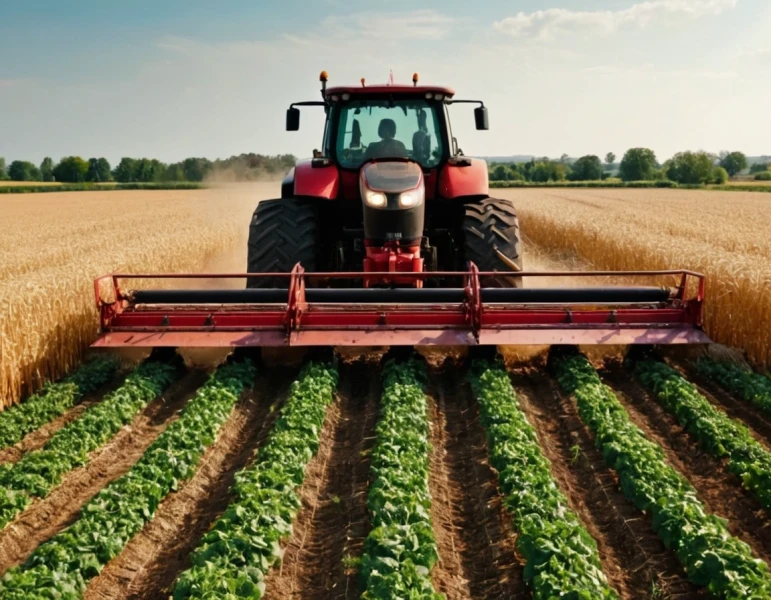Educa UNIVERSITY|SCIENCE AND ENGINEERING
Agronomic Engineering: More than Cultivating the Land, Cultivating the Future!
Related Masters
Agronomic Engineering: More than Cultivating the Land, Cultivating the Future!
I'm Rubén Águila, and if you're here it's because you're probably interested in agricultural engineering, a discipline that, more than just plowing the field, is about applying science and technology to solve some of the world's most pressing problems. Throughout my life, I've been fortunate enough to work side-by-side with agricultural professionals, and let me tell you: they are true silent heroes! Here's why.
What is Agronomic Engineering?
Agronomic engineering is much more than planting corn or tending cows. It is an interdisciplinary career that blends biology, chemistry, economics and technology to develop sustainable, efficient and resilient agricultural systems. Your mission To ensure food security in an ever-growing, climate-changing world.

This profession was formally born in the 19th century, when the industrial revolution brought advances that transformed traditional agriculture. Since then, the goal has been clear: maximizing food production while taking care of natural resources and improving the quality of rural life.
My Personal Experience in the Agronomic Field
For several years, I worked on precision agriculture projects, where we use drones and sensors to monitor crops in real time. The result? We reduced water and fertilizer use by up to 40%. Imagine what this means for a planet with limited resources!
I've also seen the direct impact of biotechnology, such as the development of pest- and drought-resistant seeds. Did you know that these innovations can make the difference between hunger and abundance in many regions of the world? I tell you with full knowledge of the facts: agronomic engineering saves lives.
Main Areas of Agronomic Engineering
If you're wondering what agronomists work in, here's a summary:
- Agrotechnology: Optimization of agricultural techniques using modern machinery and technologies.
- Plant breeding: Creation of more productive and resistant crops.
- Agricultural economics: Analysis of agricultural markets to improve profitability.
- Environmental sustainability: Protection of soil, water and biodiversity through responsible practices.
In addition, precision agriculture and the robotization of the field are the trends of the future. We are talking about harvesting robots, automated irrigation systems and predictive analytics with artificial intelligence.
The Role of Agronomic Engineering in Sustainable Development
The contribution of this engineering to the Sustainable Development Goals (SDGs) is impressive:
- Zero Hunger: Increase food production without compromising the environment.
- Clean Water: Efficient use of water resources in agricultural areas.
- Climate Action: Design systems that reduce greenhouse gas emissions.
During my years in this sector, I learned that every decision, from crop type to irrigation method, has a huge impact on the planet. Yes, it may sound exaggerated, but every hectare counts.
Challenges and Opportunities
Although agronomic engineering is exciting, it also faces significant challenges:
- Climate Change: Adapting crops to new conditions.
- Population growth: Providing food for more than 8 billion people.
- Environmental preservation: Growing crops without depleting natural resources.
And the opportunities? They are enormous! From the implementation of vertical farms in cities to the development of functional foods that benefit human health.
Is it Worth Studying Agricultural Engineering?
Of course! If you are passionate about science, technology and nature, this career will give you the opportunity to make a real difference. Moreover, the demand for agricultural engineers continues to grow, especially in countries with prominent agricultural sectors.
As someone who has seen firsthand the achievements and challenges of this profession, I can assure you that it is not just a career, it is a commitment to the wellbeing of the planet and humanity.
Conclusion
Agronomic engineering is living proof that agriculture and technology are not opposites, but allies. In every innovation, from drones to genetically modified seeds, there is a common purpose: to take care of our home, planet Earth, and all its inhabitants. If you're looking for a career with global impact, this is the path for you.
Faculties
Trainings
The faculties embrace diverse academic disciplines and fields of study, opening doors to new perspectives and exploring different spheres of wisdom in a constantly evolving world.














